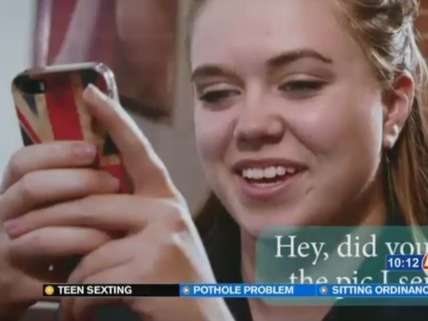Colorado Sexting Reforms Could Yield More Criminal Charges Against Teenagers
Lighter penalties are apt to encourage prosecution for behavior that shouldn't be a crime.

A Colorado bill that would reduce the criminal penalties for teenagers who exchange nude images of each other has run into opposition from critics who say it still treats such behavior too harshly. Under current law, consensual sexting involving anyone younger than 18 qualifies as "sexual exploitation of a child," a felony that triggers registration as a sex offender and a penalty of up to six years in prison, even for teenagers who take and send pictures of themselves. H.B. 1058 would make underage sexting a misdemeanor known as "misuse of electronic images by a juvenile," punishable by three to 12 months in jail, with no registration requirement. Although that sounds like a big improvement, lighter penalties are apt to encourage prosecution, and it is not clear why this sort of activity should be treated as a crime at all.
In Kansas, where the state Senate last month approved a similar bill, its chief sponsor explicitly argues that it will lead to more prosecution. "The reason this is the most underprosecuted juvenile crime is the punishment does not fit the crime," says Sen. Molly Baumgardner (R-Louisburg). The Colorado bill's supporters likewise argue that it gives prosecutors a less dauntingly draconian option for dealing with situations like last year's "sexting scandal" in Cañon City. In that case, which involved more than 100 high school students, the local district attorney decided not to bring any charges. If a misdemeanor charge had been available, he might have made a different choice.
"It's just not the right approach," Amy Hasinoff, an assistant professor of communications at the University of Colorado's Denver campus, told The Denver Post. "These prosecutors and these lawmakers think they can discourage sexting with these laws, but I don't think that's the case. That's not how it works with teen sex. Teens know sexting is risky, just like adults know it is risky. They both do it anyway." Another expert, testifying before the state legislature, complained that H.B. 1058 creates "a means for law enforcement to charge every juvenile involved in the creating of an image with a crime, even if it's a petty offense."
H.B. 1058 does give a teenager an affirmative defense against the new misdemeanor charge if he "did not solicit or request to be supplied with the image or images," "did not participate in or encourage the making of the image or images," "did not transmit or distribute the image or images to another person," and "took reasonable steps to either destroy or delete the images within 72 hours or reported the receipt of such image or images to law enforcement or a school official within 72 hours." But anyone else, including a teenager who swaps photos with a boyfriend or girlfriend, can go to jail for up to a year. Worse, a felony charge would remain an option, although it could not be filed in addition to a misdemeanor charge based on the same images.
The Post says the bill's main sponsor, Rep. Yuelin Willet (R-Grand Junction), "has introduced an amendment that would make some consensual sexting a petty offense in order to meet halfway those worried about criminalizing a trivial activity." In Colorado petty offenses are punishable by up to six months in jail and a $500 fine. Only the original version of H.B. 1058 is available online, so it's not clear what Willet's amendment covers.
According to a list that the Cyberbullying Research Center compiled in 2013 and updated last July, 11 states treat underage sexting as a misdemeanor, while 21 prescribe "diversion" or "informal penalties." The other 18 states treat sexting by minors as a felony, either explicitly or under general child pornography laws.


Show Comments (32)